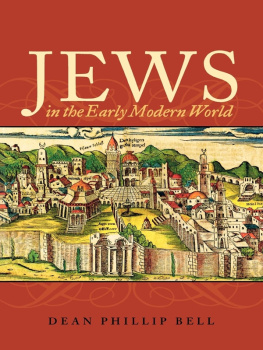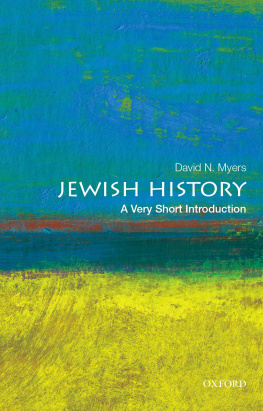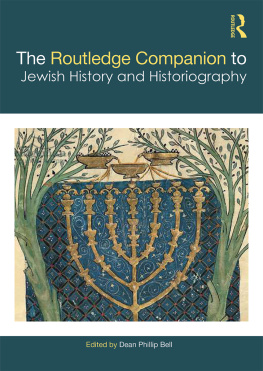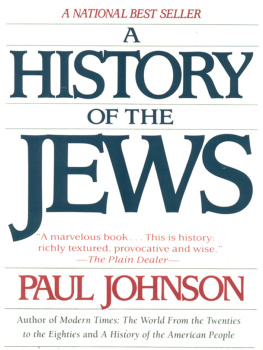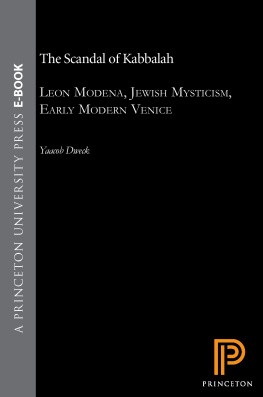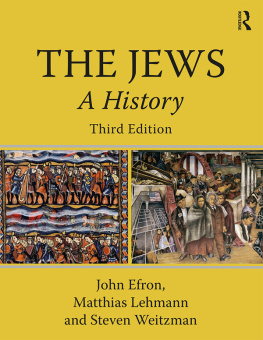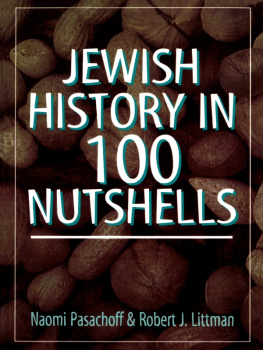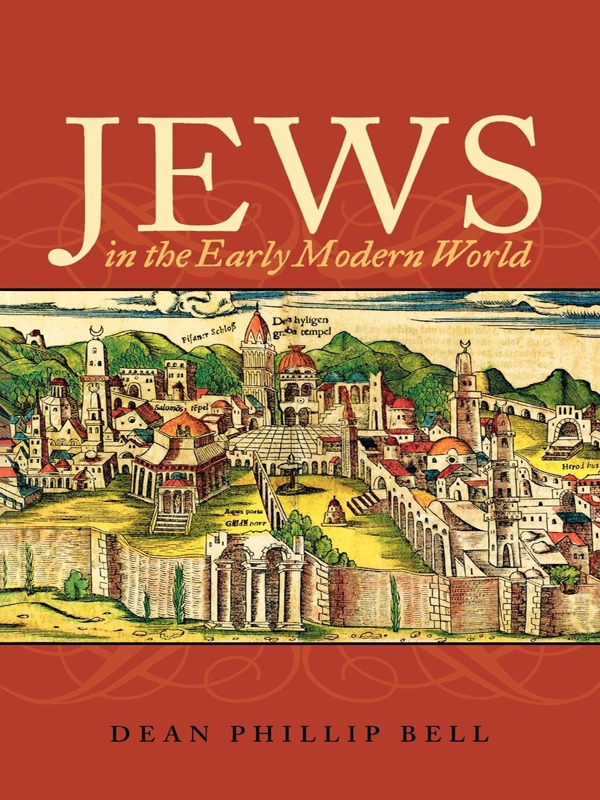This book has evolved over many years, and as I have thought about its contents and written its pages, I have benefited from wonderfully stimulating conversations with many different colleagues. I owe each of them a real debt of gratitude, for listening, correcting, criticizing (at times vigorously), and supporting me throughout this process.
I thank my colleagues at the Newberry Library, who have provided generous assistance for this and other projects over the past several years. This project could never have materialized without the assistance of my colleagues at Spertus Institutes Asher Library. In particular, many thanks go to Gail Goldberg, for her untiring efforts to track down more obscure articles and volumes than should be expected in the entire career of the most dedicated professional, and to Glenn Ferdman, director of the Asher Library, who literally rolled up his sleeves, guiding me through extensive rare book and map collections and reading an early draft of the manuscript.
This book has benefited from the insights of a wide range of students, friends, and colleagues. My students at Spertus have encountered many of the ideas in this book in various seminars over the yearsthey have provided me with encouragement and held me accountable for as much clarity and cohesion as I could deliver. I extend very special thanks to Professor Luke Clossey and the students in his undergraduate early modern world history survey at Simon Fraser University, Mandeep Bal, Denis Boko, Chad Cowles, Bailee Erickson, Stephen Greenfield, Lauren Ogston, Sasha Regehr, Anthony Sullivan, Lucas Van Meer-Mass, and Kenny Yen. They read quickly and commented extensively and constructively on the first full draft of the manuscript and helped improve the final product immeasurably. Alissa Tanzar, in her capacity as research assistant, provided similarly crucial feedback on the text; she also offered invaluable assistance in the collection and selection of images for the volume. Tony Doyle and Tracy Kostenbader labored extensively in preparing maps and images for the book, and I am appreciative of their very skilled efforts.
My colleagues Lynda Crawford, Bella Ehrenpreis, and Hal Lewis read and commented on the manuscript and challenged me to refocus and improve throughout. Brian Romer deserves special recognition for all his efforts in eliciting the idea for this book, soliciting marvelous feedback, and shepherding this volume through to publication. Without the support of my home institution, the Spertus Institute of Jewish Studies, and its president Howard Sulkin, this volume would never have become a reality. The volume is in many ways an attempt to bring together the rich resources of the Institute and to practice what has been a powerful vision of educational integration at Spertus.
In the end, this book would never have been possible in conception or execution without the support and love of my wife Juli and our children, Malkaya, Chanan, and Ronia. They listened patiently (if at times captively) to the ideas in the volume and were always willing to share me and my time with a project whose relevance to real life, or any life for that matter, was not always immediately clear. As always, Juli has been a partner in everything I do, and this work is as much attributable to her as to me and my pen.
Bibliography
Acosta, Uriel. Uriel Acosta: A Speciman of Human Life. New York, 1967.
Adler, Elkan Nathan, ed. Jewish Travellers: A Treasury of Travelogues from Nine Centuries. 2nd ed. New York, 1966.
Altmann, Alexander. Ars Rhetorica as Reflected in Some Jewish Figures of the Italian Renaissance. In Essential Papers on Jewish Culture in Renaissance and Baroque Italy, ed. David B. Ruderman, 6384. New York, 1992.
Arbel, Benjamin. Trading Nations: Jews and Venetians in the Early Modern Eastern Mediterranean. Leiden, Netherlands, 1995.
Arbell, Mordechai. Jewish Settlements in the French Colonies in the Caribbean (Martinique, Guadeloupe, Haiti, Cayenne) and the Black Code. In The Jews and the Expansion of Europe to the West, 14501800 , ed. Paolo Bernardini and Norman Fiering, 287313. New York, 2001.
Arnold, John H. Belief and Unbelief in Medieval Europe. London, 2005.
Assis, Yom Tov. The Jews of Tortosa 13731492: Regesta and Documents from the Archivo Histrico de protocols de Tarragona, compiled by Josefina Cubelis I Llorens. Jerusalem, 1991.
Avron, Dov. Poznan (Posen). In Encyclopedia Judaica. 16 vols. Jerusalem, 19711972.
Baer, Yitzhak. A History of the Jews in Christian Spain, Volume 2: From the Fourteenth Century to the Expulsion, trans. Louis Schoffman. Philadelphia, 1966.
Balaban, M. Die Krakauer Judengemeinde-Ordnung von 1595 und ihre Nachtrge. Jahrbuch der Judisch-Literarischen Gesellschaft 10 (1913): 296310; 11 (1916): 88114.
Bar-Itzhak, Haya. Jewish Poland: Legends of Origin: Ethnopoetics and Legendary Chronicles. Detroit, 2001.
Barnai, Jacob. Blood Libels in the Ottoman Empire of the Fifteenth to Nineteenth Centuries. In Antisemitism through the Ages, ed. Shmuel Almog, trans. Nathan H. Reisner, 18994. Oxford, 1988.
Baron, Salo. History and Jewish Historians: Essays and Addresses. Philadelphia, 1964.
. The Jewish Community: Its History and Structure to the American Revolution. 3 vols. Philadelphia, 1942.
. A Social and Religious History of the Jews. Vols. 1617. 2nd ed. Philadelphia, 19761980.
Bashan (Sternberg), Eliezer. Nagid. In Encyclopedia Judaica. 16 vols. Jerusalem, 19711972.
Baskin, Judith, ed. Jewish Women in Historical Perspective. Detroit, 1991.
Battenberg, J. Friedrich. Die Juden in Deutschland vom 16. bis zum Ende des 18. Jahrhunderts. Munich, 2001.
Baumgarten, Elisheva. Mothers and Children: Jewish Family Life in Medieval Europe. Princeton, NJ, 2004.
Beinart, Haim. The Expulsion of the Jews from Spain, trans. Jeffrey M. Green. Oxford, 2002 (orig., 1994).
, ed. Moreshet Sepharad: The Sephardi Legacy. 2 vols. Jerusalem, 1992.
. Saragossa. In Encyclopedia Judaica. 16 vols. Jerusalem, 19711972.
. Trujillo: A Jewish Community in Extremadura on the Eve of the Expulsion from Spain. Jerusalem, 1980.
Bell, Dean Phillip. Confessionalization in Early Modern Germany: A Jewish Perspective. In Politics and Reformations: Studies in Honor of Thomas A. Brady, Jr., ed. Peter Wallace, Peter Starenko, Michael Printy, and Christopher Ocker. Leiden, Netherlands, forthcoming.
. Jewish and Christian Historiography in the Sixteenth Century: A Comparison of Sebastian Mnster and David Gans. In Gods Word for Our World: In Honor of Simon John DeVries, ed. J. Harold Ellens, Deborah L. Ellens, Rolf P. Knierim, and Isaac Kalimi, 14158. Vol. 2. London, 2004.
. Jewish Identity in Early Modern Germany: Memory, Power, and Community. Aldershot, UK, 2007.
. Sacred Communities: Jewish and Christian Identities in Fifteenth-Century Germany. Leiden, Netherlands, and Boston, 2001.
Benbassa, Esther. The Jews of France: A History from Antiquity to the Present, trans. M. B. DeBevoise. Princeton, NJ, 1999.
Benedict, Philip. Introduction. In Early Modern Europe: From Crisis to Stability, ed. Philip Benedict and Myron P. Gutmann, 1130. Newark, DE, 2005.
Benedictow, Ole J. The Black Death, 13461353: The Complete History. Wiltshire, UK, 2006 (orig., 2004).
Ben-Sasson, Haim Hillel. Council of the Lands: Structure of Leadership. In Encyclopedia Judaica. 16 vols. Jerusalem, 19711972.
, ed. A History of the Jewish People. Cambridge, MA, 1994 (orig., 1976).
. Poland: Internal Jewish Life. In Encyclopedia Judaica. 16 vols. Jerusalem, 19711972.

